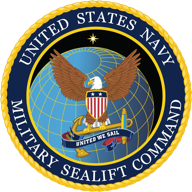Second Officer
Announcement opens continuously from 10/01/2025, with periodic cut-offs.
Average Annual Salary: $184,629 + up to a $64,235 BONUS
View the current recruitment bonus memo.
This is the average annual salary not the base pay featured in the job opportunity announcement. All calculations include CIVMAR total take-home pay (including overtime, penalty, etc.).
DUTIES
A recruitment incentive is authorized for eligible selectees and requires a service agreement. Actual amount is calculated as 25% of base pay for each year of service, not to exceed three years ($21,411 for one year, $42,823 for two years or $64,235 for three years). Incentive is paid as a lump sum at the beginning of employment with the Command. Mixed Work Schedule, VEOA candidates and Annuitants selected for employment as First Officers are not eligible for recruitment incentives.
The Second Officer is a Civil Service Mariner (CIVMAR) employed by the Navy to serve the Military Sealift Command (MSC) onboard naval auxiliaries and hybrid-manned warships worldwide, in peace and war. MSC exists to support the joint warfighter across the full spectrum of military operations. MSC provides on-time logistics, strategic sealift, as well as specialized missions anywhere in the world, in contested or uncontested environments.
Serves as a member of the Deck Department under the supervision of the First Officer. Assists the Master and First Officer in carrying out their responsibilities and duties and performs such duties that may be assigned, including assuming command of the ship in their absence. Responsible for the dual function as Navigator and Operations Officer.
As the Navigation Officer, directly accountable to the Master for the navigation responsibilities of the ship. Serves as the direct supervisor of all Watch Officers and Watch Teams both at sea and in port. Prepares a comprehensive voyage plan and briefs the Master and watch officers ensuring that the classified nature of the mission and specific information on ship’s voyages, movements and position are not indiscriminately revealed.
As the Operations Officer (OPSO), responsible for the scheduling of operational tasking and harbor movements, naval message operational traffic, tactical maneuvering coordination and communication underway, and Helicopter Control Officer (HCO). Member of the Master’s Staff and Safety Council. The OPSO is the designated position replacing the Military Detachment Officer-in-Charge. He is the direct supervisor of the Operation Chief. The OPSO provides key information to the Master and Watch Team concerning ship schedule, maneuvering and flight operations. The OPSO also works in conjunction with the Cargo Officer and CIVMAR Supply Officer to ensure all cargo evolutions are within the capability of the ship’s manning and ROC & POE.
Maintains Naval Warfare publications library and associated naval guidance and instructions.
Scheduling of harbor movements for Arrivals, Departures, Shifts, and Cargo fuel loading dates/times with MSFSC SEALOG AOR, Battle or Strike Group Commander and Port Operations to include Harbor Pilots and tugs is an intricate responsibility of the OPSO and a primary concern to the Master.
When acting as the senior watch officer, ensures that all standard navigation day’s work is performed by all watches and that operational checklists are maintained. Ensures event records on the bridge coincide with engine room records by synchronizing clocks at noon each underway day and after each time change increment. Maintains assigned berthing compartment in a neat, clean, and orderly manner.
OPSO is responsible for maintaining verbal communications over Fleet Tactical radio circuit during operational underway re-fueling to all customer-receiving ships; and to ensure direct communication with the navy customers in real time Command Chat as necessary. Responsible for ensuring the daily AKAI-6 CALL SIGNS and customer ship JANAP CALL SIGNS are provided to the Mate on Watch as well as any other pertinent information so the watch officer can maintain situational awareness.
As Second Officer (CARGO), inspects ship’s holds and cargo areas to ensure that they are clean, dry and properly ventilated. Prior to loading or discharging, has operational tests made on all cargo winches prior to rigging booms; ensures that booms are rigged and topped with preventer guys; that cargo gear is rigged according to the design specifications; that cargo spaces are properly prepared to receive the type of cargo to be loaded; that fixed cargo lights on masts and in holds are tested for operation and that portable cargo lights are available and ready for use; that installed cranes are ready for use. Ensures that cargo is delivered in good condition and notes exceptions; takes necessary precautions to prevent pilferage, damage or loss during loading, transfer or discharging operations. Ensures winches, nets, slings, bridles and other cargo-handling gear are inspected for safe operation prior to use while cargo is being worked; and that cargo is distributed according to plan, well dunnaged, marked and secured in place. On ships fitted with cranes ensures safe and effective use.
During vertical replenishment (VERTREP), ensures proper methodology of helicopter cargo and personnel transfer are used, that cargo is properly staged and weighed, readied for transfer, color coded and transferred to appropriate destination. Ensures all VERTREP equipment is properly maintained and utilized. Serves as Flight Deck Officer (FDO) during VERTREP operations.
Ensures that cargo tanks are cleaned and that all safety precautions are observed such as the use of spark-proof equipment; Butterworthing temperature and pressure limitations; and that tanks are vented properly, and are gas free, well lighted and tested before crewmembers enter them. Trains tank cleaning personnel in safety, emergency procedures and equipment. Ensures tank cleaning equipment is properly stowed and maintained. Ensures fuel oil quality control standards are met in accordance with the Fleet Oiler Manual. May be assigned collateral duty of Gas Free Engineer.
OPSO may also serve as the Afloat Environmental Protection Coordinator (AEPC) and the Public Relations Officer.
Collateral Duty: After receiving certification from MSC Drug Free Workplace Program Coordinator, will be the alternate Collection Site Coordinator (CSC) for the Drug Free Workplace Program (DFWP) onboard ships without a Medical Service Officer (MSO). Will be the alternate Breath Alcohol Technician (BAT).
Ensure continuing application and compliance with EEO laws, regulations and policies.
Everything in this Position Description is considered to be an essential function of this position. Performs all other duties as assigned.
REQUIREMENTS
Minimum Eligibility Requirements: Must be a United States citizen of at least 18 years of age and possess and maintain:
- U.S. Regular Passport (also referred to as a tourist or blue passport) with minimum of seven (7) months of expiration date.
- Transportation Worker Identification Credential (TWIC) and/or Department of Defense (DOD) Common Access Card (CAC) with a minimum of ten (10) months remaining of expiration.
- United States Coast Guard (USCG) Merchant Mariner’s Credential (MMC), with a minimum of ten months remaining of expiration date.
Position Specific Requirements:
- USCG License endorsed as: Second Mate of Steam or Motor Vessels of Any Gross Tons Upon Oceans (or higher), and Radar Observer Unlimited.
- MMC endorsed as: Any Unlicensed Rating in the Deck Department, or Able Seaman Unlimited.
- A STCW Certificate endorsed CAPACITY as Officer-In-Charge of a Navigation Watch, or Chief Mate, or Master; STCW may not include limitations of validity on vessels operating in the GMDSS system, or aboard ARPA or radar-equipped vessels.
- Minimum of 12 months of service in a watch standing position as Third Officer, as documented by CIVMAR HRMS for civil service mariner experience, and/or as documented by USCG National Maritime Center records for private sector experience.
- A Federal Communications Commission GMDSS Radio Operator's License - Above credentials and endorsements must be valid for at least seven months.
Although not required for consideration, candidates that hold Tankerman PIC (person in charge)/DL (dangerous liquids), or the appropriate Towing credentials as specified in 46 CFR 15.805(a)(5), Towing Officers Assessment Record (TOAR), possess credentials or certificates demonstrating proficiency with unusual and technical shipboard operations systems and programs such as Dynamic Positioning (DP) Systems, salvage operations, cable operations, command ship operations, or foreign naval auxiliary operations shall provide that information on the Promotion Application form.
To earn the highest rating possible, you are encouraged to submit detailed information of the knowledge, skills, and abilities listed above. Related MSC, military, and/or commercial experience, etc., will also be part of the rating process.





